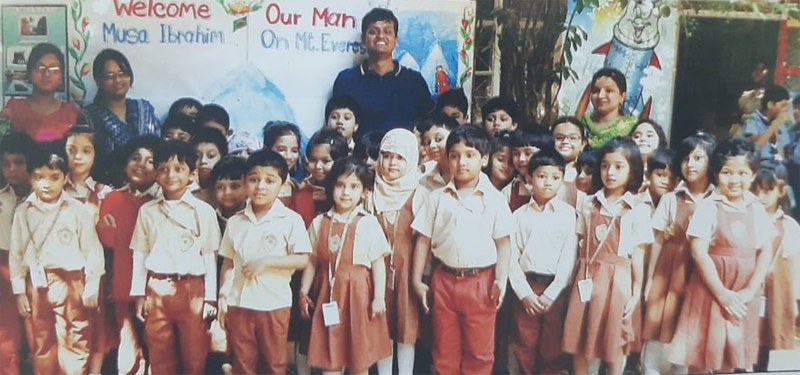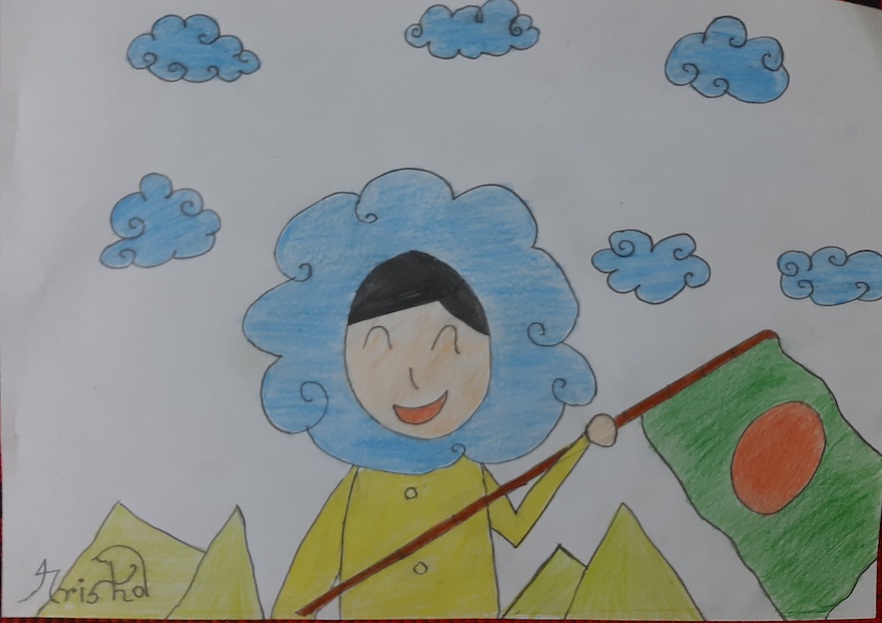The Gift from the Cloud
This poem was written by a young school girl, Syeda Ariyana Hussain Arisha, who has written other poems for the “Stories About Ourselves” website*. Arisha wrote this poem as she remembered a family holiday and also a visit to her school by a famous Bangladeshi climber. Her mother sent us the poem, and explained...
“She told me that when she was exploring our photos* of the mountains, taken during our Bandarban tour, she thought of Musa Ibrahim and the poem came to her. Musa Ibrahim is the first Bangladeshi mountaineer* to claim to have reached the summit* of Mount Everest* and he visited Arisha's school in 2015. Her photograph with Musa Ibrahim is taken from their school magazine*.”

The Gift from the Cloud
The mountain is so high,
Trying to touch the sky
For me is so ambitious,
It’s such a heavy mass.
If climbing the mountain is someone’s goal,
The cloud will touch their face and break into a hole.
If the cloud touches my face,
I will start to have happy days.

__________
Glossary
Magazine - a large soft paper book that contains information about an area of interest (eg. fashion, design, sport etc.) Usually published weekly or monthly.
Mount - a short form of the word ‘mountain’. ‘Mount Everest’ is the English name for the highest mountain in the world.
Mountaineer - a person who climbs mountains for sport or as a profession.
Photo(s) - the short form of the word ‘photograph(s)
Summit - the highest point on top of a mountain
Website - the location of a homepage, or number of pages on the Internet. Each website has a special address to help you find it called a URL. “Stories About Ourselves” is an example. Here is the URL for “Stories About Ourselves” . https://www.stories.belta-bd.org/
_______________
Learning Activities
Vocabulary
-
Words from the second 1000 high frequency General Service Word List (GSL). These words are very common in English, so it is important that you learn any of these that you do not already know.
| ambitious | during | hole | photograph | tour |
| climber/climbing | exploring | holiday | poem |
-
Words from the Academic Word List (AWL).
goal
AWL words are very common in academic English. Learn words from this list once you know around 80% of the words from the first 2000 General Service Lists of words.
(You can find these lists at the following link. http://www.newgeneralservicelist.org/)
Comprehension Questions
-
Remembering: Read the introduction to the poem again. Why did Arisha write this poem?
-
Remembering: In the poem, the writer uses the word ‘ambitious’. Why did she think it would be ambitious for her to climb the mountain?
-
Understanding: What does the phrase “the poem came to her” mean? (See the introduction.)
-
Understanding: Why would a cloud “break into a hole” when it touched a climber’s face?
-
Understanding: What is the ‘gift from the cloud’ (mentioned in the poem’s title), in your opinion?
Critical Thinking Questions
-
Analysing: What is an "ambition" or "goal" (give some examples). What is the difference between having an ambition (goal), and just deciding that you want to do something?
-
Applying: Do you have any clear ambitions or goals? What are they? How will you go about reaching your goals and achieving your ambitions? What will you do if you fail to reach your goal? What will you do if you succeed?
-
Applying: Would you like to climb Mt. Everest? Why/ Why not? The climber, Musa Ibrahim, was a kind of ‘role model’ to the children in the writer’s school. Who is your role model, and why?
-
Evaluating: What are some worthwhile goals and ambitions? What are some goals and ambitions that are not so good? Do you think it is a good thing to be ambitious? When might being ambitious cause problems? Give reasons for your answers.
-
Evaluating: Some mountains are considered sacred places by local people who live close by, and visitors are asked not to climb there. (For example Uluru, or Ayers Rock in central Australia*). Do you think visitors should be able to climb to the top of such places, or should they respect the wishes of the local people and not climb? (* for more information about climbing at Uluru, see... https://www.nationalgeographic.com/travel/destinations/oceania/australia/uluru-closing-why-it-matters/ )
-
Creating: Choose one of the following activities…
1. Do some research about Musa Ibrahim or some other famous Bangladeshi person. Prepare a poster and a short talk about that person’s life and achievements. Present your work to your classmates.
2. Do some research about Mount Everest. Prepare a short talk about the history and some interesting facts about the mountain, some of the people who have climbed it, and events that have taken place there.
3. Mount Everest is known by many different names. Find out what they are. Have a class debate or discussion in English about the following topic... “ Places should be known by the names they are given by the people of the country in which they are found, not by their English names.” Prepare your arguments beforehand and be ready to support your ideas with good information and strong reasons.
4. Think of a place you have visited, for example a place you enjoyed while on holiday. Write a list of words that describe that place and another list of words that describe your feelings about that place. Now write a poem about that place using as many of the words from your lists as you can. Draw an illustration to go with your poem. Display your poems, word lists and drawings in your classroom. Read your poems and share your work with your classmates.